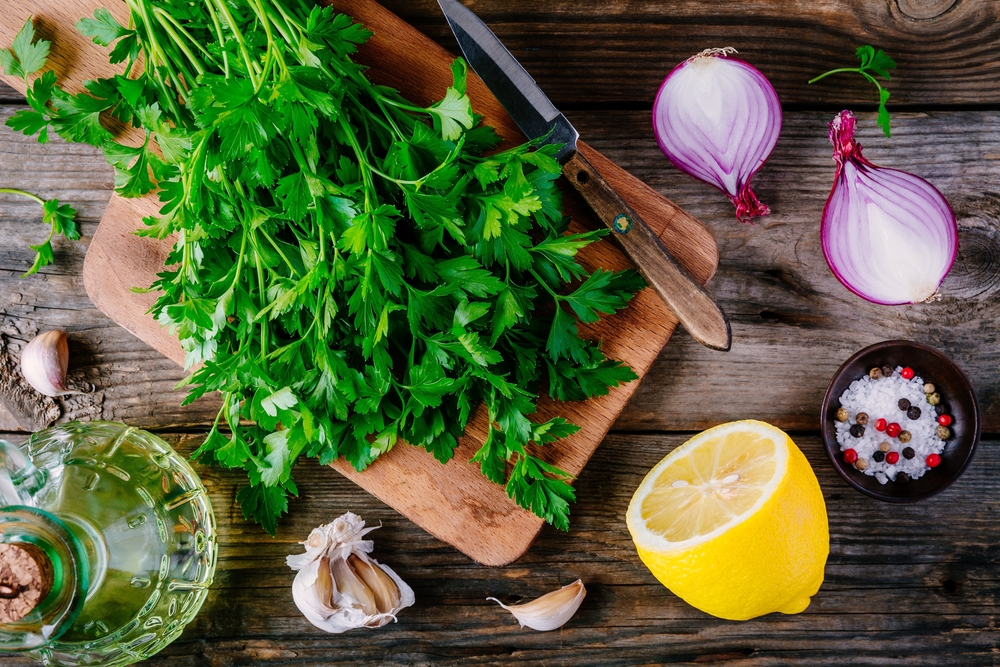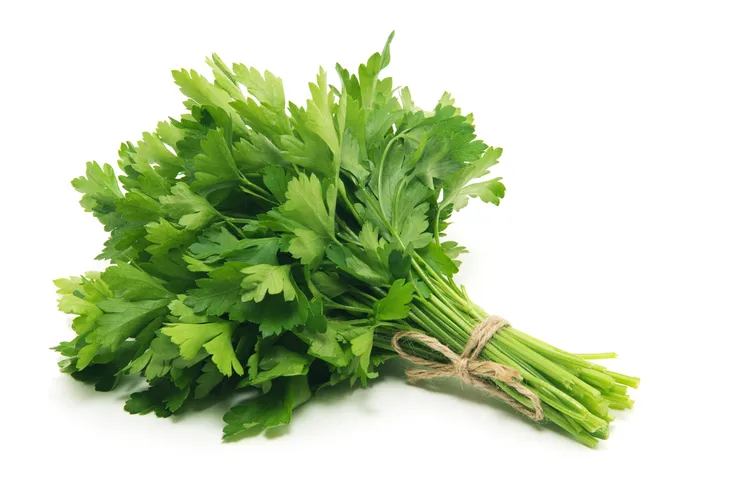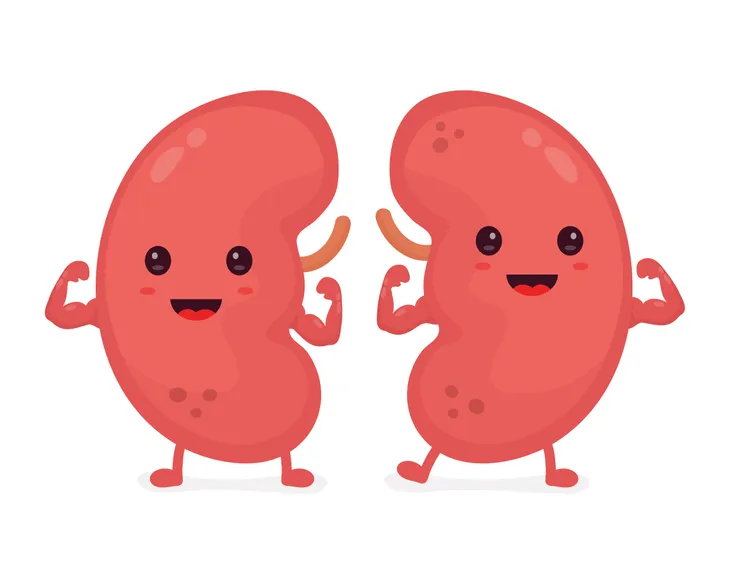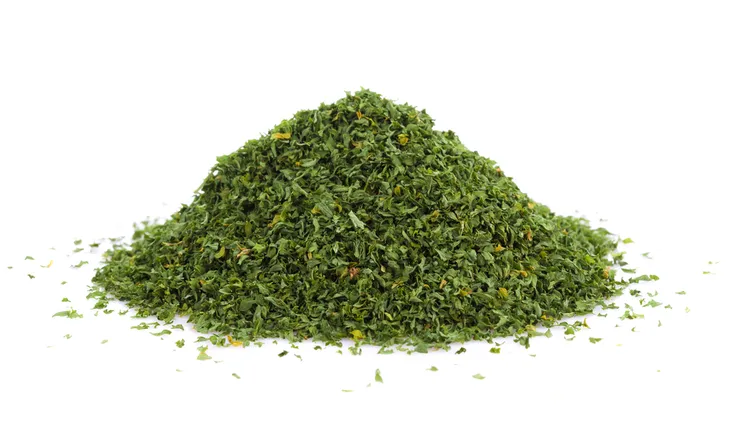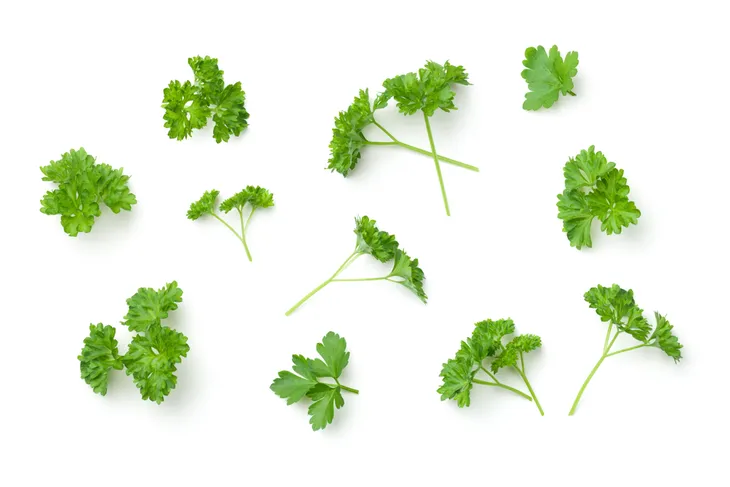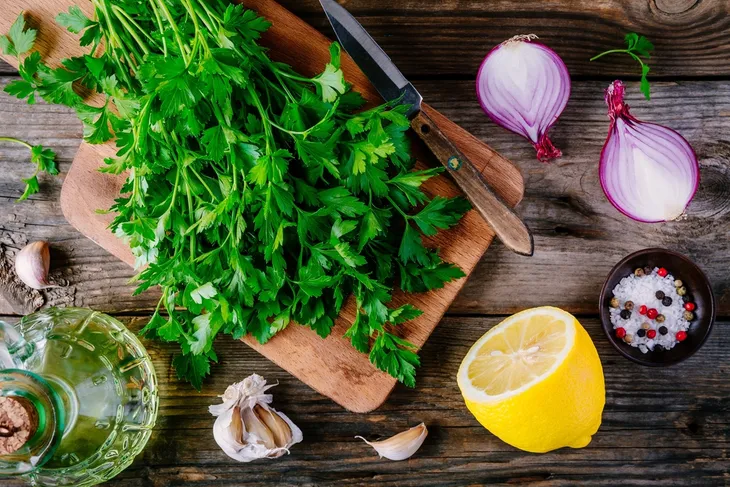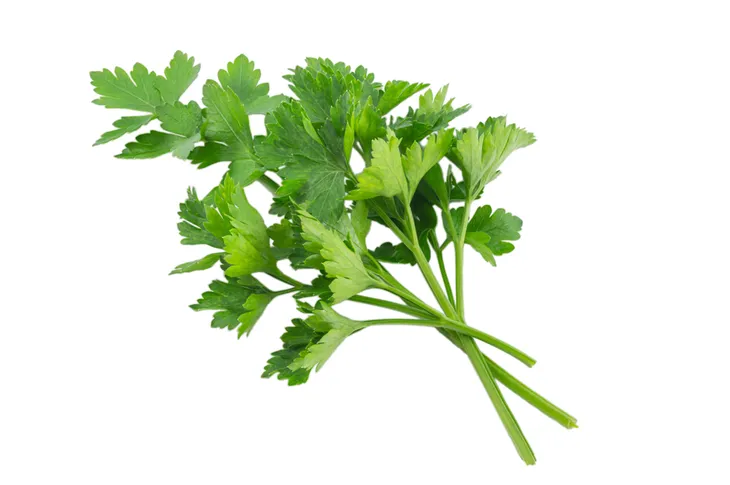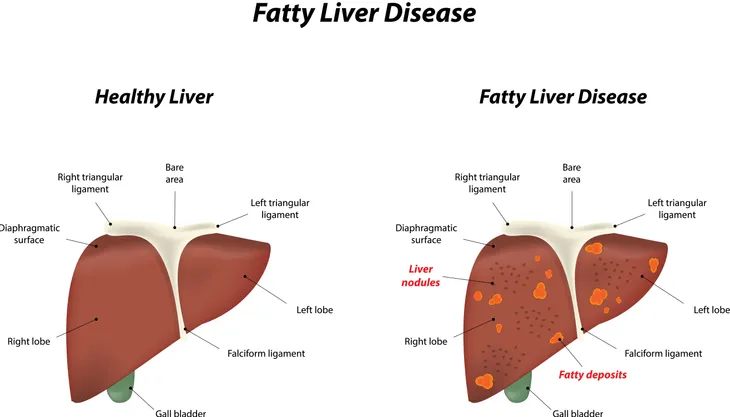We’ve all seen parsley added to a dish—it’s particularly popular in more upscale restaurants where the appearance of food is taken very seriously. However, is there any benefit to eating parsley or is the mild herb from the Mediterranean region added only for visual appeal alone? The answer: parsley is, in fact, a surprisingly healthy food, for a number of important reasons.
Having been used for centuries, it’s more than just a garnish, but an incredibly healthy herb that contains a wide range of helpful vitamins…
Parsley Contains Vitamin C
Parsley is chock full of vitamin C, one of the most highly regarded vitamins out there. Vitamin C is an essential nutrient for all humans—without it, we can develop nasty illnesses like scurvy, which can result in the rotting of the gums, an incredibly painful condition.
Vitamin C is typically associated with citrus fruits like oranges and grapefruits, but it’s also highly prevalent in parsley. Vitamin C is best known for giving our immune system a boost, thereby keeping us safe from both common and serious health conditions.
Parsley Aid Kidney Function
Bet you didn’t know that the tiny herb parsley can actually improve kidney functionality by helping the human body do away with excess fluids. But that’s the case: parsley is a diuretic and according to Livestrong.com, it plays an important role in the process of removing unnecessary fluids from the body.
But here’s the sticker: eating parsley might actually be dangerous for people with kidney or gallbladder issues. So, as long as you haven’t encountered these kinds of problems, parsley is an excellent choice.
Parsley Can Help Regulate Blood Pressure
Parsley contains ample amounts of folic acid, a type of vitamin typically found in foods like peas, lentils, oranges, whole wheat items, beets, brussels sprouts, and spinach. Research from Harvard Medical School shows that foods high in folic acid can help the body regulate blood pressure and produce and maintain new cells.
And that’s not all: folic acid may also help prevent changes to our DNA that could lead to the development of cancer. So, if you’re worried about the existence of heart disease or cancer in your family, you may want to add more parsley to your diet.
Parsley Contains Vitamin K
Okay, chances are you’ve heard a lot about vitamin C, one of the vital antioxidants found in parsley. But do you know much about vitamin K, another vitamin found in ample supply within parsley?
Probably not. Here’s the good news: vitamin K is an incredibly important nutrient in helping the body respond to injuries. Why? Because it helps in the clotting process, giving the body a chance to stop the damage and begin the healing process. Vitamin K has also been shown to help reduce the risk of bone damage and build bone durability.
Parsley Aids Digestion
Each year millions of Americans deal with a wide range of digestive problems, from ulcers to irritable bowel syndrome. There are many prescription and over-the-counter drugs that treat these issues, such as Pepto Bismol, but parsley offers a more natural remedy.
That’s because parsley contains compounds that can aid in digestion, according to research from WebMD, to alleviate the pain and discomfort associated with a range of issues, including colic, intestinal gas and constipation.
Parsley Helps Prevent Hair Loss
Are you worried about losing your hair? You’re not alone. According to the American Hair Loss Association, Americans spend more than $3 billion each year trying to prevent the loss of hair.
Unfortunately, there are few reliable remedies for this frustrating condition. But parsley might offer some help: research has shown that when parsley oil is rubbed into the scalp it can effectively limit hair loss.
Parsley Reduces Joint Pain
There’s no denying that joint pain is a huge problem in the United States. It’s also a huge business, with Americans spending billions each year to try and overcome pain associated with joint inflammation.
Parsley may offer an affordable and appetizing way to limit this pain, however. That’s because it contains anti-inflammatory properties that can reduce inflammation around the joints and ease the pain associated with conditions like osteoarthritis. In fact, a study published by the Journal of Natural Remedies found that lab rats treated with parsley leaf extract experienced reduced inflammation in their paws.
Parsley Could Help Fight Breast Cancer
Parsley is one of a number of beneficial foods that contain flavonoids, which are pigments often found in plants. Parsley is particularly high in the flavonoid apigenin, which research has shown could help reduce the multiplication of breast cancer cells.
So far the research on parsley and breast cancer has been limited to animal testing, but if you’re worried about a family history of this disease it may be wise to get more parsley in your daily diet.
Antibacterial and Antifungal Properties
Parsley has the amazing ability to fight off infections and bacteria which is why it’s so great for our skin and dental health. It contains essential oils that can eliminate fungus and treat blemishes on the skin by clearing up bacteria. “The parsley oil held within the oil of the plant’s leaves, roots and seeds is considered antimicrobial; it’s used in soaps, detergents, perfumes and other hygiene products for its ability to kill bacteria and odors,” writes Dr. Axe.
It’s important to note that parsley oil is quite strong and can irritate the skin or even cause a burn, so do not apply it directly to the skin. Dr. Axe recommends mixing it with either coconut, almond, or olive oil before applying it to the skin.
Good for the Heart
It’s important we do what we can to protect ourselves from heart troubles. In addition to certain lifestyle choices like not smoking, drinking large amounts, and making sure we exercise daily, we can also keep our heart healthy through our diet. Among the many healthy foods we can eat, parsley is one of them. This is because it contains carotenoid antioxidants which have been shown to reduce heart disease, adds the source, and folate which helps protect us from a folate deficiency.
Getting enough folate is needed to convert homocysteine. “Folate is involved in maintaining normal levels of the amino acid homocysteine, which is important given that elevated levels are associated with cardiovascular diseases,” says Carolina Guizar, MS, RDN, CDN when talking to Reader’s Digest. “Like vitamin C, folate is heat sensitive and is best retained when consumed in fresh parsley.”
The folate in parsley also protects our blood vessels by reducing homocysteine, a naturally occurring amino acid that at high levels can increase our risk of heart attack and stroke, says Chatelaine.
Ease Bloating
There’s nothing worse than sitting around feeling super bloated. It can be quite uncomfortable. If that’s the case, don’t fret! Parsley can work as a natural diuretic to relieve bloating. A 2002 study by The American University of Beirut looked at the effect of parsley on rats and found that those given parsley seed extract had an increase in their volume of urine over the next 24 hours.
“Parsley benefits digestive health because it helps stimulate kidney production of urine and draws excess water out of the abdomen, where it can cause discomfort and indigestion,” writes Dr. Axe.
Improve Blood Sugar
Elevated blood sugar levels can happen if someone eats an unhealthy diet or leads an inactive lifestyle, and they’re quite dangerous. They increase the risk of health conditions like diabetes, heart disease, and metabolic syndrome, including high blood sugar and high cholesterol.
Healthline cites animal studies that suggest parsley could play a role in helping reduce high blood sugar levels. For example, the source refers to a 2010 study published in the Journal of Diabetes Research which found that parsley was able to reduce blood sugar levels and increase the pancreas function in rats with type 1 diabetes.
The source does point out that more human studies are needed in order to make a more definitive analysis, but that adding parsley to your diet could improve blood sugar levels.
Reduce Bad Breath
Nobody is immune to bad breath — it happens to the best of us! Especially those who enjoy eating things like garlic and onions, or drink a few cups of coffee. While popping in a quick mint or rinsing with some mouthwash are probably more efficient ways to freshen up some bad breath, it can also be treated by eating some fresh parsley!
This is because parsley works to kill the bacteria that causes odors. “Parsley acts as a natural breath freshener, especially after consuming garlic or onion,” says Amanda Capriglione, RD, CDN to Reader’s Digest.
Fights Off Bladder Infections
Anyone who has suffered a urinary tract infection before knows just how painful and uncomfortable they can be. While they must be treated with antibiotics, there are some remedies we can try at home to help relieve the symptoms. Eating parsley is one of them.
“Homeopathic practitioners use this to treat urinary tract infections and kidney and bladder stones,” says Brunilda Nazario, MD to Reader’s Digest. “It contains chemicals that cause muscle contraction in the intestine, bladder, and uterus. Hence, indigestion, UTIs, and menstrual cramps were often treated with oncotions of this herb.”
Protect Eye Health
It might seem a little far fetched, but our diet can actually affect our eye health. Foods that are high in vitamin A, like parsley, also contain important antioxidants like pro-vitamin carotenoid and beta-carotene. According to Dr. Axe, these antioxidants work to protect the retina and cornea, particularly from the damage that comes with aging like in macular degeneration and cataracts.
“Parsley is a source of plant-based vitamin A,” says Carolina Guizar, MS, RDN, CDN to Reader’s Digest. “Adequate vitamin A intake ensures the optimal health of our eyes, preventing dryness, night blindness, and cataracts.”
Prevents Wrinkles
This little herb can do wonders for our complexion because it contains high amounts of vitamin C. This vitamin is super important when it comes to our skin health because it helps make collagen which keeps our skin strong and structured. “Collagen helps to iron out fine lines and wrinkles,” says Amanda Capriglione when talking to Reader’s Digest. “Make a vitamin C-packed salad with some greens (including parsley), orange pieces, and finish with a lemony vinaigrette.”
Treat Allergies
We previously talked about how parsley has anti-inflammatory properties that can treat joint pain which is why it’s also useful for treating seasonal allergies. A study published in the journal Immunopharmacology and Immunotoxicology in 2012 found that “essential oil extracted from parsley may help suppress inflammation and, in turn, aid in the treatment of inflammation-associated conditions such as seasonal allergies,” writes VeryWell Health.
An expert on natural remedies, Michael Castleman, author of The New Healing Herbs recommends steeping two teaspoons of dried parsley leaves in a cup of boiling water. You should then drink 3-cups of this tea a day.
Fatty Liver Disease
Parsley contains the powerful antioxidant pyrroloquinoline quinone, sometimes referred to as PQQ. It can also be found in kiwi, celery, and papaya. This antioxidant gives parsley the ability to stop or prevent fatty liver disease, says VeryWell Health.
A 2018 study published in the Hepatology Communications found evidence of pyrroloquinoline working to defend against fatty liver disease “in the offspring of mice fed a high-fat Western-style diet.”
